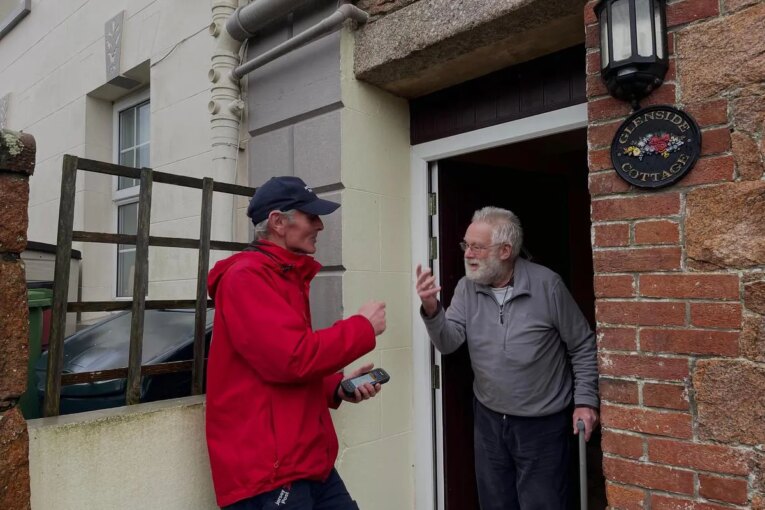
On Jersey Island, the postman always knocks twice on Christopher Brough’s door.
Every Monday and Friday, a Jersey Post letter carrier arrives at the 200-year-old row-house cottage for a quick chat.
Brough, by dint of age (he’s 76), a touch of hearing loss and history of a major stroke (“fully recovered!”), is a prime candidate for the “Call & Check” program that supports older adults living at home.
“It’s peace of mind,” Brough says. “I look forward to it. It’s another contact during the day.”
Like the “Watch Over My Parents” program offered by La Poste in France, or the “Watch Over” service in Japan, the 10-year-old Call & Check concept on this island has captured the attention of international postal services and their staff, including workers in Canada.
The potential to use Canada’s postal workers to check on and connect with often lonely older adults is detailed in a white paper by the National Institute on Ageing (NIA).
Japan’s Watch Over service, the NIA paper said, “has become one part of a broader national strategy to prevent Place,” quoted from recommendations by the House of Commons Standing Committee on Government Operations and Estimates suggesting Canada Post “look to other industry leaders that have successfully adopted innovative service models, to develop a more innovative growth agenda to expand its services.”
One such model, the NIA paper said, suggested the leveraging of postal workers to provide scheduled home visits to older Canadians.
“In addition to providing a new and innovative source of revenue for Canada Post,” the paper said, “such a program could also help to improve that ability of an increasing growing number of older Canadians to age in the right place.”
The Jersey program, it noted, is more likely to fit with a potential Canada Post model.
Like Canadian letter carriers, the Jersey Post workers do not enter homes. During Call & Check visits, the postie stands outside the door and, after chatting about the weather or the view of France on a sunny day, they ask five individualized questions that pop up on an app created by Toronto’s NexJ Health.
Based on medical conditions or other needs, the questions range from, “How are you feeling today?” to “Have you taken your medication?” or “Is there anything you need?”
The postal worker types a short response to each question into the app, a virtual-based platform that runs on the IBM cloud, and according to NexJ Health president Daniela Liggio, the answers are automatically transmitted to the Call & Check office, along with relatives, neighbours or service organizations named on the list for notification.
Several years ago, the service was picked up by the U.K. Home Office, for possible use in elder abuse prevention. Its pilot project with England’s Royal Mail ran in London, Liverpool and North Yorkshire.
Dickinson said the Home Office requested that the app’s final question be “Is anything, or anyone, bothering you?” After a 2018 trial, media reports quoted the U.K. department responsible for security saying the program “had the potential to improve the wellbeing of participants.”
Known as a tech innovator, Dickinson said his plan for Call & Check began as a pilot project after the chair of Jersey Post asked for help with ideas to stem the postal service’s diminishing revenue.
“He said to me, ‘We’ve got a real problem,’ ” Dickinson recalled during an interview. “’Every postal service in the world is in decline. We don’t really deliver letters anymore, we deliver boxes. We’re all in a bad place so can you think of anything we could do?’”
Dickinson, who spent his career in science and technology, was inspired by an earlier observation. In 2011, while living in England, he had a brain hemorrhage and after a year spent recovering at home, he had grown attuned to the daily arrival of the letter carrier, a reliable presence.
“At the same time, I started to read things about the aging demographic,” Dickinson said, citing the massive increase in older adults. “How would we want to support people? And the only real way to support them was likely in their own homes.”
The most recent global figures from the World Health Organization predict the number of people 60 and older will hit 1.4 billion by 2030, an increase of 56 per cent from 962 million in 2017. According to Statistics Canada, nearly one-quarter of Canadians will be 65 by 2031 and by 2050, up to 2.7 million will be over the age of 85.
“I thought, OK, you’ve got people who you want to support in their homes and you’ve got these posties who go every day to the house, visit, talk and they are friends. So, the thought was, could you put the two ideas together to solve a problem?”
It works for Paul McQuarrie. A veteran letter carrier with Jersey Post, he’s been to Christopher Brough’s cottage door over the years and to the homes of those who’ve signed up for the service on his regular route.
While postal workers ask questions about wellbeing, McQuarrie said they will sometimes alert Call & Check for immediate help, knowing a client is at home but doesn’t answer the door. When that happens, he says Call & Check quickly sends a health-care or social services team to the home or staff go themselves, depending on the information on file.
The postal worker steps aside, allowing professionals to take control.
“That’s as far as we go,” said McQuarrie. “We don’t give medicine. We don’t give care. And we’re not going to break into the house or do anything daft.”
You can read more of the news on source



